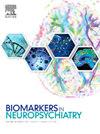Cardiovascular risk factors as potential biomarkers of length of hospital stay and rehospitalization in mood disorders – a retrospective study
Q2 Medicine
引用次数: 0
Abstract
Objective
Cardiovascular diseases are often comorbid with mood disorders, increasing the burden on patients. Few studies explore the role of cardiovascular disease on psychiatric inpatient stays. This retrospective study investigated the association of cardiovascular risk factors during an index stay on psychiatric length of stays and rehospitalization in the subsequent 10 years in patients with mood disorders.
Methods
Patients with a first inpatient stay in two German psychiatric hospitals, diagnosed with F31 (bipolar affective disorder), F32 (depressive episode) or F33 (recurrent depressive disorder) were investigated (n=930). The association of hypertension, hypercholesterolemia, and type 2 diabetes mellitus at the index stay with total length of stays, average length of stay and rehospitalization in the next 10 years was investigated in bivariate, and multivariate regression analyses, adjusting for sex, age, BMI, smoking, taking antidepressants and antipsychotics.
Results
Patients averaged 99.27 (± 134.94) inpatient days within 10 years, patients with hypertension 138.09 (± 162.85) days. Controlling for confounders, hypertension associated with longer total length of stays (β=0.105, p=0.044), hypertension (β=0.146, p=0.004), hypercholesterolemia (β=0.104, p=0.034) and diabetes (β=0.103, p=0.015) linked to more rehospitalizations and not having hypercholesterolemia (β=0.101, p=0.041) related to longer average stays. Sex mediated the relationship between hypercholesterolemia and both rehospitalization (F=11.60, p<0.001) and total length of stays (F=7.21, p=0.007), with males with hypercholesterolemia showing more rehospitalization and longer total length of stays than females.
Conclusion
Cardiovascular risk factors were associated with duration and frequency of psychiatric inpatient stays in patients with mood disorders. Cardiovascular risk factors as potential predictive biomarkers for the course of disease of mood disorders should be monitored and managed.
心血管风险因素是情绪障碍患者住院时间和再次住院的潜在生物标志物--一项回顾性研究
目的心血管疾病经常与情绪障碍并发,增加了患者的负担。很少有研究探讨心血管疾病对精神病患者住院时间的影响。这项回顾性研究调查了情绪障碍患者在首次住院期间的心血管风险因素与精神科住院时间及随后10年的再次住院时间之间的关系。在对性别、年龄、体重指数、吸烟、服用抗抑郁药物和抗精神病药物等因素进行调整后,通过二元和多元回归分析,研究了高血压、高胆固醇血症和 2 型糖尿病在首次住院时与总住院天数、平均住院天数和未来 10 年内再次住院天数之间的关系。控制混杂因素后,高血压与总住院时间延长有关(β=0.105,p=0.044),高血压(β=0.146,p=0.004)、高胆固醇血症(β=0.104,p=0.034)和糖尿病(β=0.103,p=0.015)与再住院次数增加有关,而无高胆固醇血症(β=0.101,p=0.041)与平均住院时间延长有关。性别对高胆固醇血症与再住院(F=11.60,p<0.001)和总住院时间(F=7.21,p=0.007)之间的关系起中介作用,男性高胆固醇血症患者比女性再住院次数更多,总住院时间更长。心血管风险因素作为情绪障碍病程的潜在预测生物标志物,应加以监测和管理。
本文章由计算机程序翻译,如有差异,请以英文原文为准。
求助全文
约1分钟内获得全文
求助全文
来源期刊

Biomarkers in Neuropsychiatry
Medicine-Psychiatry and Mental Health
CiteScore
4.00
自引率
0.00%
发文量
12
审稿时长
7 weeks
 求助内容:
求助内容: 应助结果提醒方式:
应助结果提醒方式:


